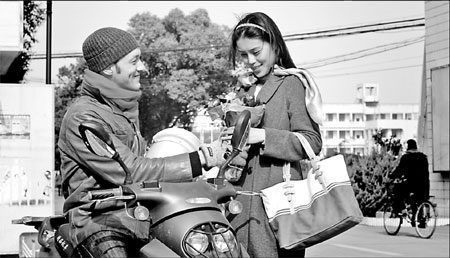Bridge across troubled waters
Updated: 2013-01-06 08:29
By Sun Yuanqing(China Daily)
|
|||||||
|
By setting the movie Foreigner in Wuhan, film director Fabien Gaillard hopes it will demonstrate the diversity of the country. Provided to China Daily |
|
Gaillard uses love stories to approach cultural and emotional differences. Zhang Wei / China Daily |
Film director Fabien Gaillard explores cross-cultural relationships without the cliches in his latest production. Sun Yuanqing reports.
Enough cliched stories have been told about cross-cultural romances, especially between Asian women and European men, so much so that French director Fabien Gaillard decided to approach a Chinese-French love story in a different way.
In his movie Foreigner (Laowai), an "impossible couple" - Paul, a French IT engineer and musician, and Mei, a traditional Wuhan girl - fall in love and strive to stay together despite the obstacles of culture and a troublesome ex-girlfriend.
"The argument is not only about cultural differences, but also about the disputes between men and women," says Gaillard, 33. "I try to make the film universal."
The Chinese-speaking movie was first shown at the Inaugural Vietnam International Film Festival in 2010 and received positive reviews.
The Hollywood Reporter called it "an unassuming romantic drama that could well be the beginning of a larger trend in Asian cinema".
Film Business Asia described it as a "cross-cultural romance that avoids all the usual pitfalls and cliches".
It premiered in Beijing on Dec 4 and runs until Jan 20 at Broadway Cinematheque MOMA, as part of a young filmmakers series.
The movie stars Gauthier Roubichou, a French musician who speaks fluent Chinese, and Han Dantong, a Chinese actress. Gaillard put much thought into casting as he wanted actors who could convey the right message.
"I want to tell a story about someone who knows about China. I want him to speak Chinese and perform and sing in Chinese."
For the part of Mei, Gaillard auditioned more than 20 actresses before finally picking Han.
"My only idea of the heroine was that I wanted her to be very traditional Chinese," he says.
"They are a kind of impossible couple, when Mei is very Chinese and doesn't speak any English, and Paul is very French.
"Paul may be the kind of guy who always goes out with girls like Vicky (Paul's ex-girlfriend), who can speak English and have a foreign cultural background. But this is the first time he has met a girl like Mei, who is truly a traditional Chinese woman."
Gaillard hopes the film will break down stereotypes.
"People might have a certain prejudice against cross-culture couples," he says. "But there are some for true love, like in the movie. And this is what the movie wants to show, to break the cliched image of women who date foreigners."
Gaillard sets the movie in Wuhan, a provincial capital of Hubei province, as a contrast to metropolitan Shanghai, to demonstrate the diversity of the country.
"The culture there is very different," he says. "I realized for the first time that China is a huge country and there are lots of different cultures inside. People in Wuhan are very warm-hearted; Shanghai is more for business. People have no time for others. They only have time for business. I want to show the contrast of the two cities, and of the two cultures."
Gaillard came to China eight years ago with his wife Yan Mi, a Beijing native. The two met in France when they were students.
Before the movie, Gaillard made two documentaries - Wo Ai Ni (I Love You), about his first trip to China and Doctor Wang, about the life of a blind masseur, who is also a friend of Gaillard.
After working at the French embassy in Beijing for about a year, Gaillard moved to Shanghai with Yan.
There he met a very different kind of foreign national. Unlike Beijing, where many foreigners work for official organizations, in Shanghai it's common to see foreigners taking on jobs like salesmen and waiters.
The more diversified foreign population in Shanghai has been a major inspiration for Gaillard. Paul in the movie, for instance, is a combination of himself and two Shanghai friends - one who works as an IT engineer and another who plays in a local band.
While the movie is based on a Chinese-French couple, Gaillard says its message is broader than cross-cultural relationships.
"It's never easy for a couple to get along," he says. "For a couple from different cultures, it's even more difficult. But even if there is difficulty, it's possible to get along together. Love is like a garden, we both have to take time to care for it so that it can grow more lushly."
Gaillard is now preparing for his next movie, which will also be a cross-cultural love story of a Chinese man and a French woman. Gaillard wants the movie to get even closer to reality.
Shot in both China and France, Gaillard says his next movie is set to be finished in 2013.
Contact the writer at sunyuanqing@chinadaily.com.cn.
(China Daily 01/06/2013 page5)

